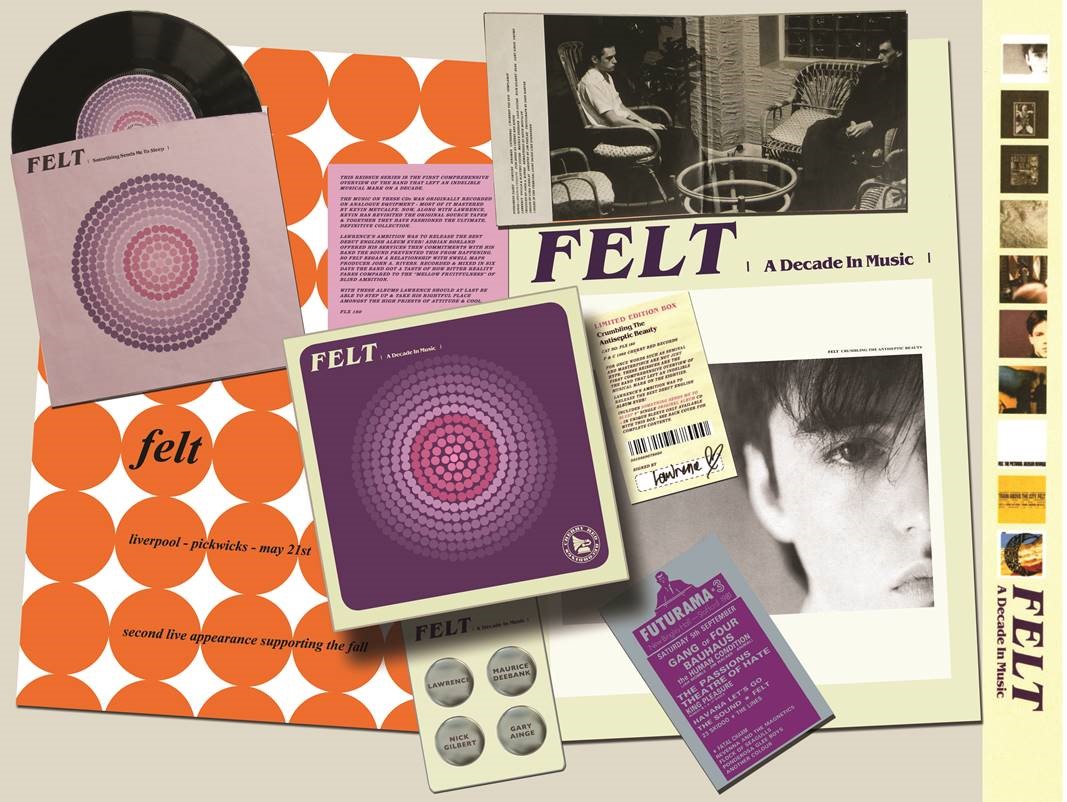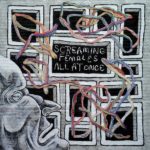Felt started life in 1979 when Lawrence released his first single, ‘Index’. The song was recorded in his bedroom and it embodies lo-fi recording. The following year, he formed a line-up planning to release ten albums and ten singles in ten years. He planned to split the group at the end of the decade. In that time, Felt members changed and released an eclectic range of records, with Lawrence playing the role of the enigmatic and eccentric front-man. It was a role he was born to do, despite the limitations of his vocal ability.
Felt’s back catalogue has been out of print for years. Finally, this month Cherry Red are reissuing the first five albums. Unlike their minimalist 2003 reissues, these come boxed with seven inch singles and various memorabilia — perfect for the obsessive fan. They’re coming out on vinyl too. These reissues make it easy to fall in love with this extraordinary and unpredictable group all over again.
:format(jpeg):mode_rgb():quality(90)/discogs-images/R-5300245-1389980697-8300.jpeg.jpg)
Crumbling The Antiseptic Beauty (1982)
Felt’s plan took shape with their bewitching off-kilter single, ‘Something Sends Me To Sleep’ in June ‘81. A year later they released their debut album, Crumbling The Antiseptic Beauty. Lawrence has always valued mystery as part of his and the band’s appeal (he refuses to reveal his surname). Crumbling is Felt’s most mysterious and abstract release. The frailty of Lawrence’s vocals are buried so deep that his lyrics are often unintelligible. His raw delivery counteracts with the classical guitar stylings of the highly-gifted Maurice Deebank. His talents are showcased on ‘Evergreen Daze’, which has a sparse arrangement with two guitars delicately intertwining with each other. There’s a subtle influence of Lawrence’s heroes, Television (in Lawrence’s Verlaine vocal style and Maurice’s use of extended guitar solos).
The album has a dry atmosphere thanks to Lawrence’s insistence on the drums having no cymbals or hi-hats. ‘Fortune’ is the most traditional song and features a stuttering drum pattern from the self-taught Gary Ainge. The tumbling Velvet Underground styled drums on ‘Cathedral’ and ‘I Worship The Sun’ contribute to their claustrophobic nervy energy. On the unsettling ‘Templeroy’, Lawrence sounds paranoid and on edge — like he’s stuck in a lucid dream. Crumbling is a truly unique debut from an era full of great post-punk music.
:format(jpeg):mode_rgb():quality(90)/discogs-images/R-390018-1431896611-7478.jpeg.jpg)
The Splendour Of Fear (1984)
After another couple of excellent singles, the provocative rush of ‘Trails Of Colour Dissolve’ and the stunning, ‘Penelope Tree’, Felt released The Splendour Of Fear in 1984. It’s a huge leap in ambition, songwriting and performance. Lawrence’s vocals may be mixed higher, but he only sings on two songs. On the stunning ‘The World Is Soft As Lace’, Lawrence hopelessly yearns for change, “if I could I would change the world, but you know my visions they’re absurd”. The swoonsome backing vocals that accompany the chorus are blissful, as are the twisting guitars. The eight minute long ‘The Stagnant Pool’ briefly features vocals before turning into a six-minute guitar solo. It’s a testament to Deebank’s intricate and detailed playing that it doesn’t drag in the slightest.
‘A Preacher In New England’ is a dreamy closer that must have been an influence on Cocteau Twins for Victorialand. ‘Mexican Bandits’ is the album’s most playful song. The hypnotic, ‘Don’t Fear The Reaper’-like guitar and rolling rhythm section bridges the bleak Crumbling with the poppier direction they’d soon take. You can hear them becoming something very special.
:format(jpeg):mode_rgb():quality(90)/discogs-images/R-467516-1430642685-5555.jpeg.jpg)
The Strange Idol Patterns & Other Short Stories (1984)
In the same year, Felt released their masterpiece, The Strange Idols Pattern & Other Short Stories. On, ‘Roman Litter’ it’s obvious how much they’ve evolved. Ainge’s drumming is punchier and Deebank’s shimmering playing is crisper, helping to make some of his most austere melodies. Lawrence’s vocals are clearer and less oblique as he repeats, “tell everybody I’m alright’. The guitar-based instrumentals act as short interludes, joining up the more conventional songs. ‘Sempiternal Darkness’ and ‘Imprint’ are both lovely two-minute songs that help make this album a cohesive listen. They echo the same stillness of Durutti Column’s best work.
The evocatively titled, ‘Sunlight Bathed The Golden Glow’ is Felt’s big pop moment. Mick Lloyd gives one of his tightest performances on bass, which drives the song’s simple and affective appeal. The stronger song structures match Lawrence’s performances, as he sounds increasingly confident. He sprinkles the song with literate and direct lyrics, “you read from the book of the dead, but you don’t know what it is about” and “I thought your poetry wasn’t saying what it should”. ‘Sunlight’ should have been their ‘This Charming Man’.
“Crystal Ball” is just as good, with Lawrence giving an impassioned vocal as he asks, “suppose someone said to you your life’s through”. The ever-reliable Deebank’s jangling guitar playing is desperately sad and poignant. He paints pictures of endless rainy days that would go on to influence the brilliant Clientele, 15 years later. ‘Whirlpool Vision Of Shame’ is an astonishing closer with heroic performances from everyone involved. John Leckie’s production brings out the best in the band, whilst letting the songs have space to breathe. In 1984 there was‘Rattlesnakes’, ‘Ocean Rain’ ‘Spring Hill Fair’ and ‘The Smiths’. Felt topped all of those with this one.
:format(jpeg):mode_rgb():quality(90)/discogs-images/R-383284-1431685609-9116.jpeg.jpg)
Ignite The Seven Cannons (1985)
After the absolute perfection of Strange Idols, Ignite The Seven Cannons was a relative disappointment. Appointing Robin Guthrie as producer appeared a smart move, but his reverb-heavy production doesn’t always do the songs justice. Unhappy with the production himself, Lawrence (with assistance from John A. Rivers) has remixed half the album. They make things brighter and bring out details lost in the muffled mix of the original, especially with the sonics of the drums. It takes a few listens to get used to the changes.
Despite the dense production, some of Felt’s strongest work is here. ‘The Day The Rain Came Down’ is one of their most straightforward pop songs and matches the beauty of Strange Idols. The dramatic ‘Textile Ranch’ and ‘Elegance In D’ are two of their most complex and satisfying instrumentals. The album’s monumental centrepiece, ‘Primitive Painters’, is one of the most mesmerising singles of the 80s. Lawrence sings some of his most heartfelt lyrics, “I don’t care about this life, they say there’ll be another one. Defeatist attitude I know will you be sorry when I’ve gone”. Elisabeth Fraser’s improvised backing vocals are typically heavenly. The gorgeous swirling guitars created by Deebank are a lush expansive wall of sound. It’s epic, it’s overwhelmingly beautiful, and it’s the best thing Felt ever put their name to.
:format(jpeg):mode_rgb():quality(90)/discogs-images/R-2042499-1431380833-3955.jpeg.jpg)
The Seventeenth Century (Formally Let The Snakes Crinkle Their Heads To Death)
Felt switched labels to Creation for their next release. They lost Deebank, who was integral to Felt’s early sound with his playing and songwriting. In a perverse move, they submitted 20 minutes of instrumental library music called, ‘Let The Snakes Crinkle Their Heads To Death’. It’s a baffling title that Lawrence regrets so much that he’s renamed it The Seventh Century for this reissue.
Martin Duffy (who’d joined on Ignite) was promoted to centre stage upon Deebank’s departure . He helped transform the second phase of their career, to a more keyboard-led approach. Lawrence also gets to prove his abilities as a lead guitarist. The ten songs that make The Seventh Century are delightfully kitsch. The wistful, ‘Song From William S. Harvey’ sounds like it should have soundtracked a kids TV show in the 70s. The slow easy-listening bossanova of ‘Indian Scriptures’ is a joy. ‘Jewel Sky’ predates Stereolab’s passion for gentle-indie-meets-60s-lounge-music by a number of years. The Seventh Century is a curio that’s a wonderful way to escape for 20 minutes. It was probably not exactly what Creation were hoping for.
Felt would release five more albums and singles in the 80s as planned, remaining one of the ultimate cult bands. Albums that followed continued to refine their take on the autumnal indie sound, and they threw further curveballs that challenged and risked alienating their fanbase. These first five albums show how a band can follow their instincts and play with their own identity so much that nobody could see what was coming next. These brilliantly put together reissues are a document of one of the most essential bands of the 80s.




